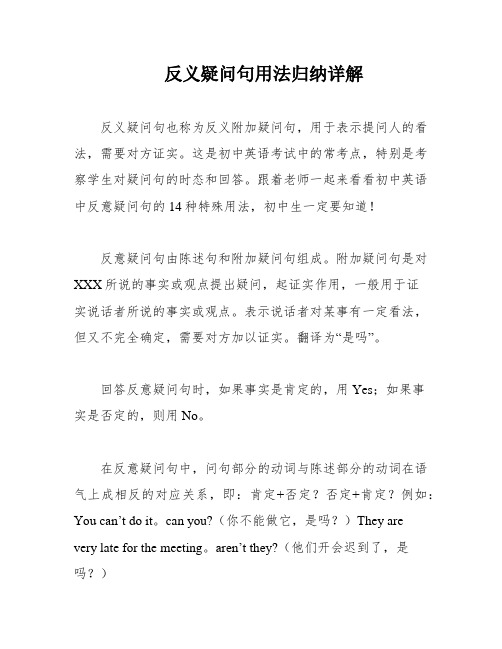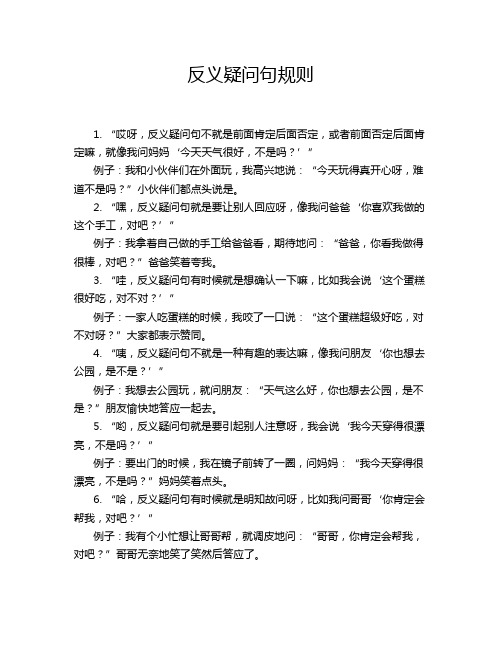反义疑问句超详细讲解!!!
反义疑问句用法归纳详解

反义疑问句用法归纳详解反义疑问句也称为反义附加疑问句,用于表示提问人的看法,需要对方证实。
这是初中英语考试中的常考点,特别是考察学生对疑问句的时态和回答。
跟着老师一起来看看初中英语中反意疑问句的14种特殊用法,初中生一定要知道!反意疑问句由陈述句和附加疑问句组成。
附加疑问句是对XXX所说的事实或观点提出疑问,起证实作用,一般用于证实说话者所说的事实或观点。
表示说话者对某事有一定看法,但又不完全确定,需要对方加以证实。
翻译为“是吗”。
回答反意疑问句时,如果事实是肯定的,用Yes;如果事实是否定的,则用No。
在反意疑问句中,问句部分的动词与陈述部分的动词在语气上成相反的对应关系,即:肯定+否定?否定+肯定?例如:You can’t do it。
can you?(你不能做它,是吗?)They arevery late for the meeting。
aren’t they?(他们开会迟到了,是吗?)附加问句的主语应与陈述句的主语保持一致,且只能用人称代词替代。
例如:You come from Beijing。
don't you?(你来自北京,是不是?)当陈述句中含有be动词、助动词或情态动词时,反问句部分由这些词加上主语人称代词构成。
例如:He will go home。
won’t he?(他要回家了,是吗?)She doesn’t like to eat popcorn。
does she?(她不喜欢吃爆米花,是吗?)在使用have时,反义疑问句的动词需根据具体语境决定。
当have表“有”时,反义疑问句谓语动词可用have或do。
例如:He has a new car。
doesn’t/hasn’t he。
当have表“吃、喝、玩、度过、举办”等时,反义疑问句谓语动词需用do。
例如:He has supper at home every day。
doesn’t he?They had a great time in Beijing。
反义疑问句的用法归纳及回答举例

反义疑问句的用法归纳及回答举例
1. 哎呀呀,反义疑问句就是在陈述句后面加上一个简短问句呀!比如“你喜欢看书,不是吗?”,这里就是先陈述“你喜欢看书”,然后问“不是吗”。
2. 咱要注意哦,如果前面陈述句是肯定的,后面的反义疑问句就要用否定形式呢。
就像“他很聪明,不是吗?”。
3. 反过来,如果前面是否定陈述句,那后面的反义疑问句就得是肯定的啦!比如“她今天没来,对吧?”。
4. 回答的时候可别糊涂呀!要是同意就说“是呀”或“对呀”,不同意就直接说“不是”。
就好像人家问“今天天气不错,不是吗?”,觉得对就说“是呀”。
5. 有时还会遇到特殊情况呢,像“Let's go shopping,shall we?”这时候就得用“shall we”呀。
6. 还有那种祈使句的反义疑问句呢,“别跑太快,好吗?”就是一种呀。
7. 哎呀,这反义疑问句用法不复杂吧,一学就会啦!就像学骑自行车,掌握了技巧就没问题啦!
8. 记住这些要点,以后再遇到反义疑问句就不怕啦!反义疑问句其实挺好玩的呀,能让我们的交流更有趣不是吗?我觉得掌握反义疑问句真的很有用,能让我们的表达更丰富呢。
反义疑问句的用法归纳

反义疑问句的用法归纳关键信息项:1、反义疑问句的定义及构成2、反义疑问句的回答方式3、不同时态下反义疑问句的构成4、特殊句型中的反义疑问句用法5、祈使句中的反义疑问句规则11 反义疑问句的定义反义疑问句是一种附加在陈述句后面的简短问句,用于询问对方对陈述句所表达内容的看法或确认信息的真实性。
111 反义疑问句的构成反义疑问句由两部分组成:陈述句+简短疑问句。
简短疑问句通常由“助动词/情态动词/be 动词+主语(代词)”构成。
如果陈述句是肯定的,简短疑问句则是否定的;如果陈述句是否定的,简短疑问句则是肯定的。
112 举例说明例如:“You are a student, aren't you?”(你是个学生,不是吗?)“He doesn't like coffee, does he?” (他不喜欢咖啡,是吗?)12 反义疑问句的回答方式回答反义疑问句时,要根据事实情况来回答,而不是根据问句的形式。
如果事实是肯定的,就用 yes 回答;如果事实是否定的,就用 no 回答。
121 肯定回答的情况当陈述句为肯定,反义疑问句为否定时,如果事实是肯定的,回答用 yes。
例如:“You like music, don't you?” (你喜欢音乐,不是吗?)如果确实喜欢音乐,回答应为“Yes, I do” (是的,我喜欢。
)122 否定回答的情况当陈述句为否定,反义疑问句为肯定时,如果事实是否定的,回答用 no。
例如:“You aren't a teacher, are you?” (你不是老师,是吗?)如果确实不是老师,回答应为“No, I'm not” (不,我不是。
)13 不同时态下反义疑问句的构成131 一般现在时如果陈述句的谓语动词是 be 动词,反义疑问句中就用 be 动词的相应形式;如果陈述句的谓语动词是实义动词,反义疑问句中要用助动词 do/does。
例如:“She is beautiful, isn't she?” “He works hard, doesn't he?”132 一般过去时反义疑问句中要用助动词 did。
反义疑问句规则

反义疑问句规则1. “哎呀,反义疑问句不就是前面肯定后面否定,或者前面否定后面肯定嘛,就像我问妈妈‘今天天气很好,不是吗?’”例子:我和小伙伴们在外面玩,我高兴地说:“今天玩得真开心呀,难道不是吗?”小伙伴们都点头说是。
2. “嘿,反义疑问句就是要让别人回应呀,像我问爸爸‘你喜欢我做的这个手工,对吧?’”例子:我拿着自己做的手工给爸爸看,期待地问:“爸爸,你看我做得很棒,对吧?”爸爸笑着夸我。
3. “哇,反义疑问句有时候就是想确认一下嘛,比如我会说‘这个蛋糕很好吃,对不对?’”例子:一家人吃蛋糕的时候,我咬了一口说:“这个蛋糕超级好吃,对不对呀?”大家都表示赞同。
4. “咦,反义疑问句不就是一种有趣的表达嘛,像我问朋友‘你也想去公园,是不是?’”例子:我想去公园玩,就问朋友:“天气这么好,你也想去公园,是不是?”朋友愉快地答应一起去。
5. “哟,反义疑问句就是要引起别人注意呀,我会说‘我今天穿得很漂亮,不是吗?’”例子:要出门的时候,我在镜子前转了一圈,问妈妈:“我今天穿得很漂亮,不是吗?”妈妈笑着点头。
6. “哈,反义疑问句有时候就是明知故问呀,比如我问哥哥‘你肯定会帮我,对吧?’”例子:我有个小忙想让哥哥帮,就调皮地问:“哥哥,你肯定会帮我,对吧?”哥哥无奈地笑了笑然后答应了。
7. “呐,反义疑问句就是这样的啦,像我问妹妹‘你也喜欢看动画片,是不是?’”例子:我和妹妹在看电视,我问她:“你也喜欢看动画片,是不是?”妹妹开心地说喜欢。
8. “嘿呀,反义疑问句能让对话更有意思呢,我会说‘你不会不喜欢吃冰淇淋吧?’”例子:我拿着冰淇淋问小伙伴:“这么好吃的冰淇淋,你不会不喜欢吃吧?”小伙伴赶紧说喜欢。
9. “哎呀呀,反义疑问句就是这样特别呀,像我问奶奶‘您最疼我了,对吧?’”例子:我依偎在奶奶身边,撒娇地问:“奶奶,您最疼我了,对吧?”奶奶满脸慈爱地说是。
10. “哇塞,反义疑问句可太有用啦,比如我问同学‘明天要上学,对吧?’”例子:放学的时候,我和同学讨论,我说:“明天要上学,对吧?”同学也说是呀。
英语反义疑问句的问句与回答归纳

英语反义疑问句用法讲解一、基本概念及结构:反义疑问句又叫附加疑问句,是指当提问的人对前面所叙述的事实不敢肯定,而需要向对方加以证实时所提出的问句。
其结构为:前一部分是一个陈述句,后一部分是一个简短的问句。
完成后一部分简短问句时,要根据前面陈述句的动词时态和人称来选择适当的助动词进行提问,前后两部分的人称和动词时态要保持一致。
如果前一部分用肯定式,后一部分一般用否定式;反之,前一部分为否定式,后一部分要用肯定式,即“前肯定后否定,前否定后肯定”。
例如:You don’t like rock music, do you 你不喜欢摇滚乐,对吧二、反义疑问句的回答不管是前否后肯,还是前肯后否形式的反义疑问句,回答都根据事实回答,肯定的答案就用yes+肯定结构,否定的答案就用no+否定结构,答案要和实际情况相符。
也叫实事求是例如:1、--She is good at English, isn't she--Yes, she is. 是的,她擅长或者No, she isn't.不,她不擅长2、--There isn't a computer in your r oom, is there“你的房间里没有电脑,对吗?-- Yes, there is.不,有电脑或者 No,there isn't.是的,没有电脑。
三、其他规则:1、陈述部分用否定词或半否定词 no , nothing, nobody, never, few, seldom, hardly, rarely, little 等否定含义的词时,疑问部分用肯定形式。
例如:He is never late for school, is he?他上学从不迟到,是吗2、陈述部分的谓语是used to 时,疑问部分用didn’t +主语或 usedn’t +主语。
例如:He used to take pictures there, didn’t / usedn’t he 他过去常常在那儿拍照,是吗You used to sleep with the windows open, usedn’t/ didn’t you你过去常常开着窗户睡觉,是吗?3、陈述部分为祈使句时,祈使句后加附加问句,不表示反意,而表示一种语气。
反意疑问句的用法归纳及回答举例

反意疑问句的用法归纳及回答举例1. 反意疑问句概述嘿,大家好!今天咱们来聊聊一种在英语里特别有趣的句型——反意疑问句。
听起来挺拗口的,但别担心,我会用简单易懂的方式带你搞定它。
反意疑问句,顾名思义,就是在一句话末尾加上一个小问题,用来确认之前说的内容。
这种句型在日常对话中非常常见,让我们来看看它是怎么回事。
比如说,你告诉朋友:“今天天气真好。
”接下来,你可能会加一句:“对吧?”这就是反意疑问句。
这个小句子“对吧”就是用来确认你说的事情是否正确。
用这种句子就像是在和人聊家常一样自然,也能让对方参与到对话中来。
2. 反意疑问句的构成说到反意疑问句的构成,其实也没那么复杂。
它主要有两部分:前面的陈述句和后面的疑问句。
简单来说,你先说一个陈述句,然后用相反的疑问句来进行确认。
这个疑问句的部分就像是小小的“审问官”,来确认你说的话是否正确。
2.1 主语和谓语的匹配首先,反意疑问句的主语和谓语要和前面的陈述句保持一致。
比如,你说:“她已经完成了工作。
”为了确认这点,你会问:“她不是吗?”这里,“她不是吗”就是反意疑问句,主语“她”与前面的陈述句一致,谓语“不是”也是相对的。
2.2 确认和否定的转换其次,反意疑问句的一个关键点是,前面的陈述句是肯定的,后面的疑问句就用否定;反之亦然。
例如,“你喜欢这部电影,对吧?”如果前面的陈述句是负面的,比如“他不喜欢这件事”,那么反意疑问句就会是“他是吗?”这样,前后句子的情感方向就相反了。
3. 反意疑问句的回答方式说到反意疑问句的回答,那也是有讲究的哦。
通常,回答的时候要看你是否同意前面的陈述句。
如果同意,就用肯定的回答;如果不同意,就用否定的回答。
举个例子,你的朋友说:“这家餐厅的菜很好吃,对吧?”如果你同意,可以回答:“是的,确实很好吃。
”如果你不同意,可能就会说:“其实我觉得一般般。
”3.1 肯定回答当你同意对方的陈述时,直接用“Yes”或者“确实”来回应。
例如:“这部电影很有趣,不是吗?”你可以说:“是的,我也这么觉得!”这样你就和对方达成了共识。
反义疑问句详解

反意疑问句详解反意疑问句是由两部分组成的,前一部分是对事物的陈述(即陈述句),后一部分是简短的提问(即简短疑问句),中间用逗号隔开。
如果前一部分用肯定句,后一部分就用否定疑问句;如果前一部分用否定句,后一部分就用肯定疑问句。
两部分的人称和时态要一致。
其回答是用yes或no来表示。
但是,当陈述部分是否定形式时,回答要按事实。
如:They don’t work hard, do they? 他们不太努力工作,是吗?Yes, they do. 不,他们工作努力。
/No, they don’t. 对,他们工作不努力。
一、含be(is, are, was, were)动词的反意疑问句其句型是:句型1:主语+ be+其它,isn’t (aren’t, wasn’t, weren’t)+ 主语?句型2:主语+ be not+其它,is (are, was, were) + 主语?①You are from America, aren’t you?Yes, I am. No, I’m not.②It isn’t very cold today, is it? Yes, it is. No, it isn’t.③Tom was away yesterday, wasn’t he?Yes, he was. No, hewasn’t.④The Greens weren’t at home last night, were they?Yes, theywere. No, they weren’t.⑤Mary is reading English now, isn’t she?Yes, she is.No, she isn’t.⑥Your parents aren’t going to have a party this Sunday, arethey? Yes, they are. No, they aren’t.⑦The girls were singing when the teacher came in, weren’tthey?Yes, they were. No, they weren’t.注意:There be句型①There is an old picture on the wall, isn’t there?Yes,there is. No, there isn’t.②There aren’t any children in the room, are there?Yes,there are. No, there aren’t.③There wasn’t a telephone call for me, was there?Yes,there was. No, there wasn’t.④There were enough people to pick apples, weren’tthere? Yes, there were.No there weren’t.二、行为动词的一般现在时的反意疑问句其句型是:句型1: 主语+动词原形+其它,don’t I (you, we, they)?句型2: 主语+ don’t+动词原形+其它,do I (you, we, they)?句型3: 主语+动词第三人称单数+其它,doesn’t he (she, it)?句型4: 主语+ doesn’t+动词原形+其它,does he (she, it)?①You often watch TV in the evening, don’t you?Yes,I do. No, I don’t.②The students don’t study hard, do they?Yes, they do. No, they do n’t.③Mary studies Chinese hard, doesn’t she? Yes, she does. No, she doesn’t.④The boy doesn’t often go to school by bike, doeshe? Yes, he does. No, he doesn’t.⑤The first class begins at eight, doesn’t it?Yes, it does. No, it doesn’t.三、行为动词的一般过去时的反意疑问句其句型是:句型1: 主语+动词过去式+其它,didn’t+主语?句型2: 主语+didn’t+动词原形+其它,did +主语?①You watched TV last night, didn’t you?Yes, I did. No, I didn’t.②Jim’s parents didn’t go to Hong Kong last month, did they? Yes, they did. No, they didn’t.③The rain stopped, didn’t it?Yes, it did. No, it didn’t.④Mr. Clarke didn’t buy a car, didn’t he?Yes, he did. No, he didn’t.四、一般将来时的反意疑问句其句型是:句型1: 主语+will+动词原形+其它,won’t+主语?句型2: 主语+ won’t +动词原形+其它,will +主语?①The boys will play games, won’t they? Yes, they will. No, they won’t.②It won’t stop raining, will it?Yes, it will. No, it won’t.③Mr. Smith will visit our school next week, wo n’the? Yes, he will. No, he won’t.注意:There be句型的一般将来时①There will be a basketball match tomorrow, won’tthere? Yes, there will. No, there won’t.②There won’t be too much pollution in the future, will there? Yes, there will. No, there won’t.五、现在完成时的反意疑问句其句型是:句型1: 主语+have+动词过去分词+其它,haven’t+主语?句型2: 主语+ haven’t +动词过去分词+其它,have +主语?句型3: 主语+has+动词过去分词+其它,hasn’t+主语?句型4: 主语+ hasn’t +动词过去分词+其它,has +主语?①You have been to Shanghai before, haven’t you?Yes I have. No, I haven’t.②You haven’t been to Shanghai before, have you? Yes I have. No, I haven’t.③Jack has done his homework, hasn’t he? Yes, he has. No, he hasn’t.④Jack hasn’t done his homework, has he?Yes, he has. No, he hasn’t.六、现在完成进行时的反意疑问句其句型是:句型1: 主语+have been+动词现在分词+其它,haven’t+主语?句型2: 主语+ haven’t been +动词现在分词+其它,have +主语?句型3: 主语+has been +动词现在分词+其它,hasn’t+主语?句型4: 主语+ hasn’t been +动词现在分词+其它,has +主语?①You have been skating for five h ours, haven’tyou? Yes, I have. No, I haven’t.②You haven’t been skating for five hours, haveyou? Yes, I have. No, I haven’t.③Bob has been collecting kites since 1999, hasn’the? Yes, he has. No, he hasn’t.④Bob hasn’t been col lecting kites since 1999, hashe? Yes, he has. No, he hasn’t.七、含有情态动词的反意疑问句其句型是:句型1: 主语+情态动词+动词原形+其它,情态动词否定形式+主语?句型2: 主语+情态动词否定形式+动词原形+其它,情态动词+主语?①You can speak French, can’t you?Yes, I can. No, I can’t.②They can’t un derstand me, can they? Yes, they can. No, they can’t.③Ann could swim when she was six, couldn’t she? Yes, she could. No, she couldn’t.注意:1. 陈述句部分含有情态动词must时的具体情况⑴must表示“必须”之意,附加问句的谓语用needn’t如:They must come on time, needn’t they? Yes, they must. No, they needn’t.⑵但若表推测这层含义时,不能用must,而要根据陈述部分的不定式结构(即must之后的动词)以及含义采用相应的动词形式。
反义疑问句(共14张PPT)全

二、前否+后肯
1.She wasn’t ill last week, was she ? 2.It doesn’t often rain here, does it? 3.Tom won’t go to Shanghai next year,
will he ?
特殊用法1—祈使句的反义疑问句
1、肯定祈使句的反意疑问句,疑问部分用will you或won’t you,否定祈使句则用will you ? 如: Don't do that again, will you? Go with me, will you / won't you?
13、He who seize the right moment, is the right man.谁把握机遇,谁就心想事成。2024/10/172024/10/172024/10/172024/10/1710/17/2024 +14、谁要是自己还没有发展培养和教育好,他就不能发展培养和教育别人。2024年10月17日星期四2024/10/172024/10/172024/10/17 +15、一年之计,莫如树谷;十年之计,莫如树木;终身之计,莫如树人。2024年10月2024/10/172024/10/172024/10/1710/17/2024 +16、教学的目的是培养学生自己学习,自己研究,用自己的头脑来想,用自己的眼睛看,用自己的手来做这种精神。2024/10/172024/10/17October 17, 2024 +17、儿童是中心,教育的措施便围绕他们而组织起来。2024/10/172024/10/172024/10/172024/10/17
一 、前肯+后否 含be动词
1.He is a doctor, isn’t he? 2.I am Chinese, aren’t I?
- 1、下载文档前请自行甄别文档内容的完整性,平台不提供额外的编辑、内容补充、找答案等附加服务。
- 2、"仅部分预览"的文档,不可在线预览部分如存在完整性等问题,可反馈申请退款(可完整预览的文档不适用该条件!)。
- 3、如文档侵犯您的权益,请联系客服反馈,我们会尽快为您处理(人工客服工作时间:9:00-18:30)。
反义疑问句一、基本要点1、概念。
反义疑问句是疑问句的一种,它对陈述部分的事实提出相反的疑问,形式上是一个省略问句,附加在陈述句后通常译为“是吗?”形式:主句(陈述句),从句(问句)?You are from America, aren’t you?2、回答。
情况属实:Yes, I am/情况不属实:No, I’m not3、从句动词与主句动词在语气上是相反的关系,即:“前肯后否,前否后肯”①You can’t do it, can you?②They are very late for the meeting, aren’t they?【注意】:主句带有little, few, never, hardly, seldom,nobody, nothing, barely, scarcely等否定意义的词时,从句用肯定式。
①She never tells a lie, does she? ②He was seldom late, was he?二、一般构成法1、当主句含有be动词,助动词,或情态动词时,从句由这些词+主语人称代词构成。
be动词:am, is, are, was, were助动词:do, does, did, have, has等情态动词:can, could, may, might, must, will, would, shall, shouldShe is a lovely girl, isn’t she?He will go home, won’t he?She doesn’t like to eat apple, does she?The baby won’t sleep early, will it?【注意】:前后主语要相同。
2、当主句只有实义动词(行为动词)时,从句用do的适当形式。
(若动词加了s,就用does, 若动词为原形,就用do,动词为过去式,则用did)。
You cleaned your house last week, didn’t you?Your father plays the computer very well, doesn’t he ?They look so happy today, don’t they?He has supper at home every day,doesn’t he?They have known the matter, haven’t they?【巩固练习】1. Linda ate nothing this morning, ___?A. didn’t sheB. was sheC. did sheD. wasn’t she2. There’s hardly___ milk in the bottle, _____there?A. no, isn’tB. some, isC. little, isn’tD. any, is3. He has never ridden a horse before, ___?A. does heB. has heC. hasn’t heD. doesn’t he4. — He seldom came here, _____? — Yes sir.A. didn’t heB. does heC. doesn’t heD. did he5. They have no time to visit the museum, _____?A. do theyB. haven’t theyC. don’t theyD. will they6. He dislikes the two subjects, _____ he?A. doesB. doesn’tC. isD. isn’t7. These tools are useless now, _____ ?A. are theyB. aren’t theyC. is itD. isn’t it三、考点考点①.从句与主句主语不相同的若干情况(需牢记):1.主句主语为 this 或that时,从句主语改为itThis is your brother, isn’t it?2.主句主语为 these或those时,从句主语改为theyThose are books , aren’t they?3. 主句主语为不定代词one时,从句主语改为one或heOne can’t be always young, can one / he?4.主句主语为不定代词 something、anything、everything、nothing时,改itNothing is serious, is it?Something has happened to them, hasn’t it?5. everybody、everyone、somebody、someone、anybody、anyone、nobody改为they或he(任选,但选定后注意单复数形式)Everyone knows this, don’t they / doesn’t he?Someone has taken the seat, hasn’t he?6.each of改he或theyEach of the boys had an apple, didn’t he / they?7. no one, none, neither, either改they 或heNo one came, did they?8. some of…、none of …改it、they或you(联系上下文或句子)None of the food was delicious, was it?Some of the dustmen have come back, haven’t they?9. 由neither…nor…、not only…but also、both…and…、either…or…、not…but…、…or…、…and…等连接的并列主语,改复数代词Neither you nor I am wrong, are we?Both Tom and Jack came, didn’t they?10. 由动词不定式、动名词、从句或词组构成的主语,改itTo learn English well isn’t easy, is it?Swimming is great fun, isn’t it?11. the + 形容词表示一类人,改复数代词The poor had no right to speak at the time, did they?12. there 引起的句子(There be句型等),仍用thereThere are many children in the park, aren’t there?There stands a house and a lot of trees, doesn’t there?【巩固练习】1. Everything seems all right, _____ ?A. does itB. don’t theyC. won’t itD. doesn’t it2. No one failed in the exam, _____ ?A. was heB. did oneC. did theyD. didn’t he3. Neither you nor I am a artist, _____ ?A. am IB. aren’t weC. are weD. ain’t I考点②.情态动词的反意疑问句1. 主句种有can’t(表示推测,“不可能”),从句根据can’t后的动词选择相应的形式He can’t be a doctor, is he?The workers can’t have finished their work, have they?2. 主句用may ,从句用may + 主语 + not (英语中不用mayn’t)They may be here next week, may they not?3. must(必须),用needn’tYou must do it today, needn’t you?4. must(应该)用mustn’tI must study hard, mustn’t I?5. mustn’t用must或mayYou mustn’t talk like that, must you?6. “must be”对现在事实进行推测,从句用be动词的相应形式。
He must be happy, isn’t he?They must be working hard at the office, aren’t they?7. need和dear作实义动词时,从句用doHe needs help, doesn’t he?I have never dared to ask him, have I?8.need和dear作情态动词时,用need和dearHe dare not say so, dare he?We need not do it again, need we?9. needn’t用need或mustHe needn’t do that, must he/need he?10. “ would rather + do”和“would like to +do”用wouldn’tHe would rather read the text ten times than recite it, wouldn’t he?You’d like to have some bananas, wouldn’t you?11. “ought to + do”用oughtn’t /shouldn’tWe ought to go there, shouldn’t we?12. “used to + be”用“didn’t + 主语/usedn’t + 主语/used + 主语 + not”He used to live in London, didn’t he /usedn’t he / used he not ?【巩固练习】1. He can’t be her father, _____ he?A. isB. isn’tC. canD. can’t2.You’d better go at once, _____ you?A. hadn’tB. didC. didn’tD. don’t3. You’d rather work than play, _____ you?A. hadn’tB. wouldn’tC. didn’tD. mustn’t4. He used to get up at 6:30, _____ he?A. didn’t heB. did heC. used heD. wouldn’t he5. He ought to win the first prize, _______ he?A. mustn’tB. oughtn’tC. shouldn’tD. Both B and C.考点③特殊句型的反意疑问句1. I am…改aren’t II am your friend, aren’t I?2. I wish to do sth或I wish I …改may II wish to go home, may I?3. 一般的肯定祈使句则用will you 或won’t you 都行Do sit down, won’t you?/ will you?Please open the window, will you? (won’t you?)否定的祈使句用will you或can youDon’t make a noise, will / can you?4. Let’s…表示建议包括听话人在内,用shall weLet’s go for a walk, shall we?5. let us …表示请求允许,不包括听话人在内,用will youLet us do it by ourselves, will you?★Let’s not …用OK或all rightLet’s not go to the party, OK / all right?6. 主从复合句,反意疑问句与主句的主谓语保持一致David wouldn’t go there if it rained, would he?【注意】1.当主语是第一人称单数2.主句动词为think、know、believe 、suppose 、imagine、except 。
